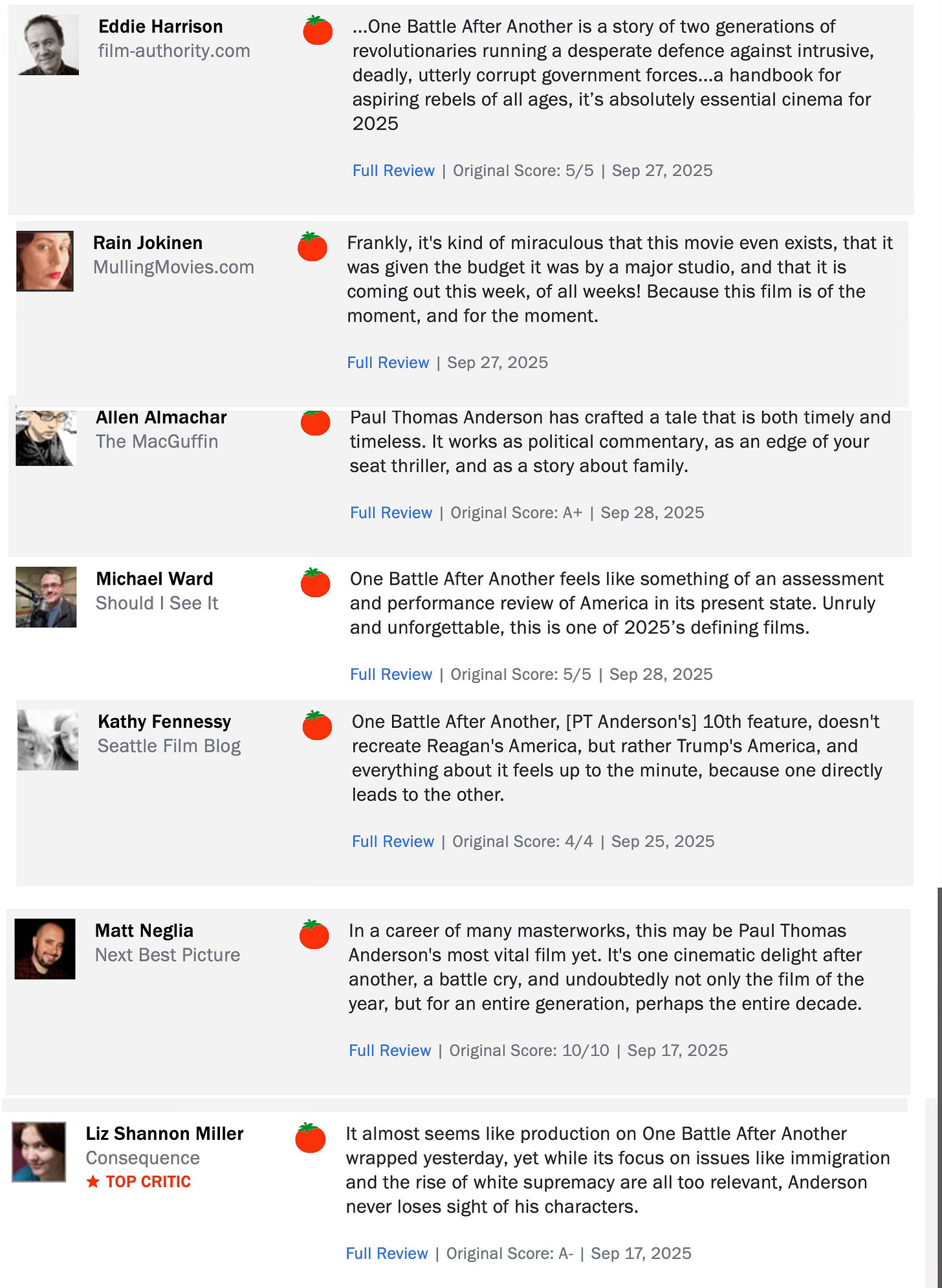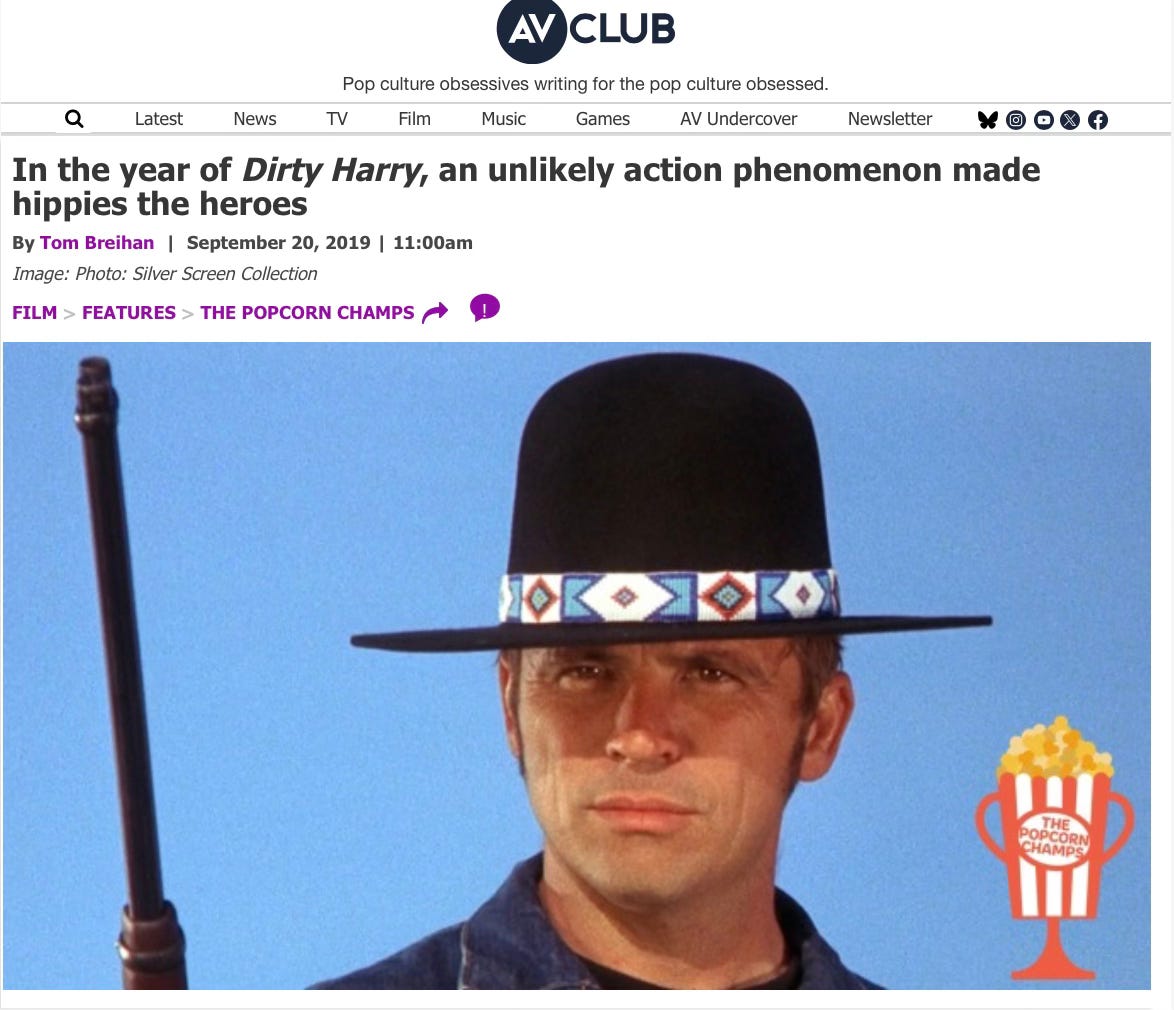The Good
Warner Bros. has almost single-handedly rescued the movie business this year by making original films that people turned out to see, and they made money. F1, Sinners, and Weapons are all in the top 20 highest-grossing films of the year. Now, Paul Thomas Anderson’s One Battle After Another, with a hefty price tag of $140 million, just hit theaters. Can it make back its money? Probably not.
Even if it does fail at the box office, it won’t be allowed to fail. It will be lauded with film awards, maybe even Oscars. Is it a good movie? It’s well-made. Is it funny? At times, yes. Some of the action sequences are great. The cinematography, the acting, and the directing are all top-notch. But as one of the audience reviewers put it on Rotten Tomatoes:
One Battle After Another is a film for a very specific type of person, and that type of person just happens to be our elite ruling class, who somehow see themselves as oppressed because they borrow oppression of marginalized groups that they speak for in their films, their TV shows, their books, their late-night comedy, and their media.
PTA is a great director, but he’s never been my cup of tea. I don’t think I’ve seen any of his movies more than once. He has a cult-like following of film fans who adore everything he does, and this movie is no exception.
Shot in large format Vistavision, the film looks great. It mostly keeps things rolling, so that the lengthy runtime, over two hours, speeds by. That’s if you like the movie. If you don’t, you’ll be bored by the one-hour mark.
The best thing about it is Leonardo DiCaprio’s performance as Bob, the ne’er-do-well ex-revolutionary raising his daughter Willa (Chase Infinity).
The plot is more or less about a group of radicals (think: ANTIFA) who shoot up an ICE detention facility before going on the run after shooting a cop. The main radical is Perfidia Beverly Hills (an excellent Teyana Taylor), who is sleeping with both the racist ICE agent, Lockjaw, played by Sean Penn, and Bob. She gets pregnant and assumes Bob is the father.
But when the revolution calls to Perfidia, she abandons her baby, leaving Bob to raise Willa. All of this would have made for a much better movie had they stuck to it, but instead, we have to follow Lockjaw, who now wants to join an elitist group of white supremacists, and because he once slept with a Black woman, he has to find out if Willa is his biological daughter and, if so, wipe her off the map.
Meanwhile, loser Bob is in a race against time to find his daughter and save her now that the underground has taken her off to a hiding place. Yes, that’s the plot, for better or worse. Mostly worse.
The Bad
It may be that what we call “woke” storytelling is now here to stay, and that there will never be a return to the way things were before. Those rules mean only white people are allowed to be evil or bad guys. All people of color and LGBT individuals must be portrayed in a positive light, for instance.
Teyana Taylor in this film seems to be headed in a complex or negative direction, or at least someone who is not admirable. But if you know the rules of Woketopia in movies, you know how her character will turn out in the end. There is no way they will allow her to be seen as bad.
That means, at least for me, I already know what the story will be about and how the movie will end just based on the casting alone. One Battle After Another checks every box, up to and including Leonard DiCaprio de-centering himself from the narrative, as all white men must. They’re not allowed to save women anymore.
In the Left’s America, and in the film and television shows they produce, each of us is judged by our identity group - skin color, gender, or how well the film panders to the marginalized groups. That is what seems to decide good and bad now. And I don’t know if that will ever change.
It must be present in every movie. It’s in F1 and in Weapons. Every time you see a sampling of intersectional characters, you know they are only there because they are mandated to be there, not necessarily because it fits with the story.
That is why the critics are so over the moon.
To them, it is everything they are and everything they believe, a validation of their mass delusion that Trump didn’t win a fair election in 2024 but rather he and his Nazi army stormed DC, and they’re all trying to survive in a racist/fascist nation. They really do believe this because they have locked themselves away from the rest of America, and no one in the media will ever tell them the truth.
What would be funny is if someone made a movie about that, their collective delusion about being oppressed as the side with still so much wealth and power. They just don’t like sharing this country with people who do not agree with them. Coming the closest is Ari Aster, who made the film Eddington that satirizes the awful year that was 2020, and does so by pointing out how different real life was from virtual life, where a Civil War rages on.
One Battle After Another aims to be satire, but it mocks the Left with the lightest of touches. There is one scene where one of the progressive activists is mocked by saying he doesn’t feel “safe,” and we sympathize with Bob’s frustration as he screams at him. He just wants to save his daughter. He doesn’t care about the rest of it. But the movie cares.
The Ugly
One Battle After Another reminds me of the agitprop B-movie Billy Jack, which was released in 1971, the same year as Dirty Harry.
One Battle is better made, for sure, but it’s the same idea.
We don’t have a Hollywood that would catch the wave of the way America was changing in 1971. Dirty Harry was popular because America was tired of the hippies. They were tired of crime. They were ready to move in a different direction.
There’s a reason Dirty Harry has stayed with us all of these years, and Billy Jack has faded. That’s probably because Clint Eastwood became a formidable force in American film. But there might be something to the idea that Dirty Harry was a Trump-like figure back then, someone who didn’t exactly fit in the progressive Left culture but who somehow found a way to resonate, though people today would call it “racist.”
Either way, I wish we had a Hollywood now that would make movies for audiences rather than movies for critics. The critics don’t seem like they assess movies so much as they use film and writing about film to push their social justice agenda outward. There aren’t many areas on the Left anymore that don’t.
It’s one thing to abandon half the country and make culture and art only for themselves. It’s another thing to turn normie America into The Enemy, which One Battle After Another does in its one-sided view of the border crisis, in its obedience to portraying the white people as bad (except Stoner Bob) and the marginalized people as good.
For ten long years, the Left has been demonizing and dehumanizing not only the Right but the silent majority as “racists,” which has distorted their worldview and wrecked their ability to tell good stories for everyone. But it’s even worse than that. If half of America is their enemy, how can they possibly expect them to buy tickets to see their movies?
If you are a working-class American who is worried about the border and so you voted for Trump, this movie will tell you that you are a “racist” going along with crimes against humanity with mass deportations. If you are an ICE agent, a cop, or a soldier, you are the Gestapo in this movie.
Here is a good rundown by Chris Gore and Alan Ng for Film Threat.
This isn’t a movie that will incite more violence against ICE officers, but it is a movie that celebrates those who do as heroes, and it affirms the mass delusions of the Left better than probably any movie ever made. No wonder they are euphoric. This is their Ben-Hur.
Ultimately, I have to wonder about the collective sanity of the Left. Is it that they will only feel safe if they somehow cancel half the country? Do what with all of those people they see as their biggest threat? You know, their fellow Americans? Throw them into gulags?
Perhaps worst of all, the way critics and the media responded to the film made me realize that movies, like everything else, are weapons in our ongoing Civil War. This one would count as a “win” for the Left because they know it will hurt and anger the Right. If the movie bombs, which it might, it counts as a win for the Right, and the cycle continues.
Just as Billy Jack reflected a part of America in 1971 that America would ultimately leave behind, while Dirty Harry became a part of its future, with Ronald Reagan's election in 1980, One Battle After Another could end up being the definitive portrait of the Hollywood Woketopia that so many have already left behind.
That makes it an odd legacy for Paul Thomas Anderson, who will forever be seen less as the auteur he once was, and more as someone who spoke for a generation trapped inside a Doomsday Cult.
//













